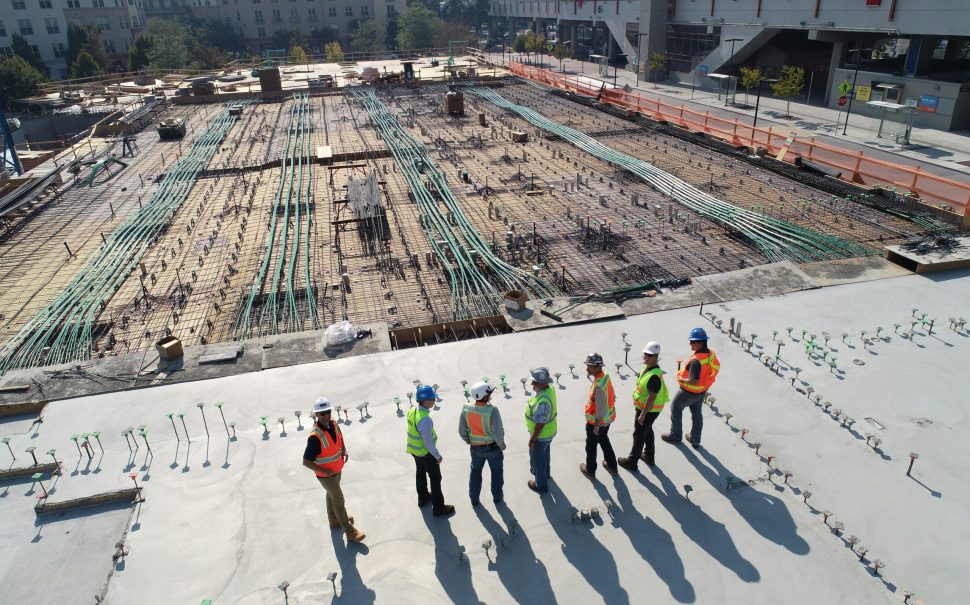London stands at the forefront of the global sustainability movement, with construction companies leading an unprecedented transformation.
The capital has set an ambitious target to achieve net-zero carbon emissions by 2030, positioning itself as a global leader in sustainable urban development.
This commitment represents more than just environmental responsibility, it’s reshaping how construction companies London approach every project, from small refurbishments to large-scale commercial developments.
The drive towards net-zero construction encompasses buildings that produce as much energy as they consume over their lifecycle, minimising carbon emissions during construction, operation, and eventual demolition.
For construction companies London, this shift represents both a challenge and an extraordinary opportunity to pioneer innovative building solutions.
Why construction companies are leading the charge
Construction companies London are uniquely positioned to drive the capital’s net-zero ambitions forward.
The construction industry accounts for a significant portion of global carbon emissions, making it a critical sector for achieving climate goals.
Forward-thinking construction companies London are recognising that sustainable practices aren’t just environmentally beneficial, they’re becoming essential for business competitiveness.
The City of London Corporation has introduced stringent regulatory measures that encourage net-zero projects, with building codes now incorporating comprehensive sustainability standards.
Construction companies in London that adapt early to these requirements are positioning themselves advantageously in an increasingly competitive market.
Sustainable building practices transforming London
Innovative technologies and materials
Construction companies London are embracing cutting-edge technologies and materials to reduce environmental impact.
The integration of smart systems that monitor energy consumption in real-time is becoming standard practice, optimising resources like lighting, heating, and cooling throughout a building’s lifecycle.
Leading projects demonstrate the potential of these innovations.
Notable examples include all-electric building systems powered by renewable energy sources, which significantly reduce emissions compared to traditional gas boilers.
Construction companies London are increasingly specifying low-carbon materials such as cross-laminated timber, recycled steel, and sustainable concrete alternatives.
Retrofit-first approach
The City of London has implemented a ‘Retrofit First’ approach, prioritising the reuse of existing structures over new construction.
This strategy significantly reduces embodied carbon – the emissions generated during material production and transportation – while preserving the capital’s unique architectural character.
Construction companies London specialising in retrofitting and refurbishment are finding increased demand for their services, as this approach aligns with both environmental goals and economic efficiency.
The emphasis on circular economy principles encourages developers to minimise waste and reuse materials throughout a building’s lifecycle.
Regulatory framework driving change
London’s regulatory landscape is evolving rapidly to support net-zero construction goals.
The Planning for Sustainability Supplementary Planning Document provides comprehensive guidance covering five critical themes: retrofit and reuse, greenhouse gas emissions and energy use, circular economy principles, climate resilience, and urban greening and biodiversity.
Construction companies London must now meet stringent embodied carbon benchmarking requirements.
Developments failing to meet these benchmarks at the planning stage are required to deliver additional sustainability benefits, such as expanding local energy networks or implementing innovative climate resilience measures.
Office buildings, which dominate London’s skyline, are subject to particularly rigorous standards.
Benefits for construction companies and clients
The transition to net-zero construction offers substantial benefits for both construction companies London and their clients.
Sustainable building practices often result in long-term cost savings through reduced energy consumption and operational efficiency.
Additionally, green buildings command premium rents and higher property values, making them attractive investments.
As businesses become more environmentally conscious, they actively seek construction partners who can deliver projects aligned with their sustainability commitments.
The future of London construction
Construction companies London are at the centre of this transformation, with sustainability becoming increasingly integrated into every aspect of project delivery.
Modular construction and prefabrication methods are gaining popularity due to their efficiency and reduced environmental impact.
These approaches allow construction companies London to achieve faster build times whilst minimising waste and disruption.
As London continues its journey towards net-zero by 2030, construction companies London will remain pivotal in shaping a sustainable urban future.
Those embracing innovation, sustainability, and regulatory compliance today are building the foundation for tomorrow’s success in an increasingly environmentally conscious market.
Feature image: Free to use from Unsplash





